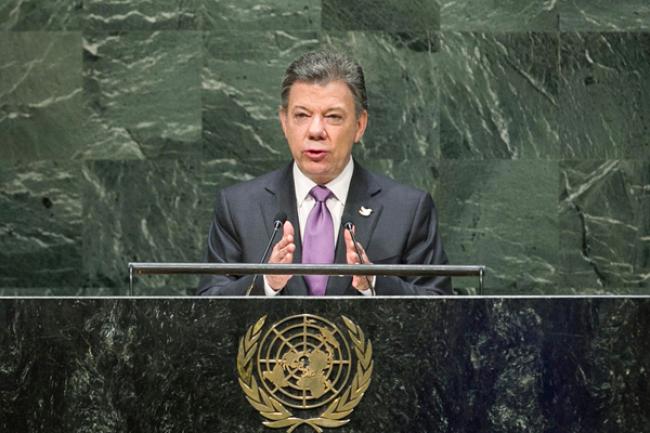26 Sep 2014, 07:09 am Print

“To the international community, I make an impassioned appeal for us to put all that we can…into ensuring that humanity overcomes war,” President Juan Manuel Santos said in his address. “We are losing direction when we look at the tragedies that humanity is suffering, without being pained. It is time to wake up! It is time to act!”
He said that in a world full of bad news, of war, of terrorism, of disease, “I would like to bring a ray of hope to this Assembly: the hope that, after more than half a century of conflict, Colombia will soon be at peace. If we achieve this – a goal that Colombians have unsuccessfully sought for so long – then there is hope for peace in any part of the world, despite how difficult things can seem right now.”
Santos explained that the nearly two years of talks taking place in Havana, Cuba, between the Colombian Government and the Revolutionary Armed Forces of Colombia (FARC) guerrillas in Cuba, have been a serious, realistic, efficient and credible, with concrete results.
Three of the 5 identified points of action had been agreed – comprehensive rural development; political participation and an enhanced focus on addressing drug trafficking. A major focus to that end had been improving the agricultural sector and the lives, land and livelihoods of famers. “We agreed to continue dismantling the drug mafia structures, to promote a national programme of crop substitution and alternative development and to address the problem of consumption from a public health perspective.”
A Colombia without coca and without conflict was an impossible dream just a few years or decades ago, Santos said, adding: “Just imagine it.” As for the last two substantive points – addressing the concerns of victims and ending the conflict – are underway. Indeed, the conflict had left many victims but they are now at the heart of the political and reconciliation processes. Representatives of the victims are setting out their concerns and needs to both the Government and the armed groups.
As the post-conflict phase approached, however, he said that Colombia will face “immense challenges” to reintegrate those who have demobilized, to ensure State presence in areas affected by conflict, and to guarantee security. “The support and contribution of the international community will be so important, that we call upon it from now!”
Yet even in all this, Colombia is not oblivious to the suffering of those who live in Syria, Iraq, Libya, the Sahel and Ukraine. It also condemned the ruthless terrorism of Islamic State in Iraq and the Levant (ISIL) . “We are not indifferent to the suffering of so many families in Palestine and Israel, victims of armed confrontations. Neither to the loss of life due to epidemics such as Ebola in Africa.”
As the Organization's 70th anniversary approached, the global community finds itself at a definitive moment for the legitimacy of the international system embodied by the UN. “The complete respect for international law and the purposes and principles established in the UN Charter is essential to attaining lasting solutions to overcome conflict, and progress in the fulfilment of the legitimate aspirations of the people,” he said.
President Juan Manuel Santos Calderón of Colombia addresses the General Assembly. UN Photo/Cia Pak
- Trump signs 10% global tariff, says it takes effect ‘almost immediately’
- BJP wins a seat in Bangladesh — But not the one you think!
- Meet Shabana Mahmood: Could she take over as UK’s first Pakistani-origin Muslim PM?
- Dalai Lama's Office breaks silence on Epstein claims
- Russia says suspect in shooting of GRU Deputy detained in Dubai





-1763561110.jpg)
